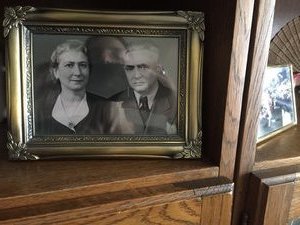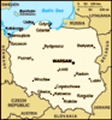Advertisement
Published: July 24th 2015

 Bella and Zundel
Bella and Zundel
My father's aunt and uncle of blessed memory. From a photograph on the shelf in the house they built in the 1930s and where their daughter still lives. Yesterday was a big day. Our Polish cousin Artek (Arthur) met us at the hotel and took us by car to spend time with the family. My father had been with them already on three earlier trips to Poland; my brother and mother had also met them on trips to Poland and on visits that some of them have made to the States. I have vague recollections of my grandmother's older sister Bella from her one visit to New York when I was a child and another of her daughter Irene when she came to the U.S. when I was a teenager. I had never, however, met her children and grandchildren.
But despite having never met them until yesterday this remnant of my grandmother's family was familiar to me because of the stories shared about them, first from my grandparents. I'd heard about a town several hours south of Warsaw, Bella, a dentist and my grandmother's older sister, and her husband Zundel, a physician, had gone to live and work in the early 1930s and then returned to after the war. I'd heard that Zundel, from a family with rabbinic lineage, was an anti-religious socialist who provided medical care for

 Irene and her son at her home
Irene and her son at her home
We spent the afternoon with the family eating cakes, drinking tea, and getting to know each other. My father was translator. all the townspeople in this working class town of 19000 inhabitants, including about 2800 Jews, often free of charge for those who could not pay. I'd heard he was very beloved by the townspeople and that was one of the reasons that he, his wife, and their two children (Irene, born in1922/23 and Henryk, born in1925), survived the war. I'd heard also of the bravery of the Polish Catholic turned Communist who fell in love with Irene, married her in 1943, and helped save her, her parents, and brother by finding them hiding places and providing them with food.
I'd also been told that Irene (known to us affectionately as Irusha), raised in a secular Jewish home, had found faith and chose to convert to Catholicism when she married. Her first child, a son, was born in 1944, a second, a daughter, in 1947, and a third, a son, in 1952. My grandmother had wanted her sister and brother-in-law and their family to leave Poland and come to the United States, especially after a trip she made in 1947 to see them in Poland.
It didn't happen. After the war Zundel and his family returned from hiding. During

 Cousins
Cousins
They are both energetic talkers!the war Nazi officers occupied the house Zundel built in 1933/1934, where on the other side of the street the town ghetto was established in 1941. After the Soviets liberated the town the Poles had quickly occupied their home. When Zundel came back after the war he chased them away and reclaimed his family's property. They were the only remaining Jews in the town, one whose population was deported en masse to Treblinka. Zundel died in1952 at 59. The war had taken its toll. Bella lived until 1986. Their son, now 89, established himself in Paris. Their daughter Irusha, now 92, still lives in the house built by Zundel and Bella, and it is where she raised her three children with her husband who died in 2006. She has children (3), grandchildren (6), and great grandchildren (10) who all live in Poland, most no longer in their town of birth, who have created families of their own. They are contributors to Polish life in all sorts of ways and in all sorts of places.
Their family heritage from the Jewish side is not one that is easy to navigate in Poland even today. To be of Jewish lineage in

 The Backyard Garden
The Backyard Garden
Zundel made sure he got his home back after the war. this country strikes me as a legacy that remains an encounter, sometimes in the shadows and sometimes not, with the very gnarly realities of pre-war, war-time, and post-war (and post Communist) life.
And in our long and fascinating drive south from the urban metropolis of the capital to the provincial town, and then again to another urban center, where other relatives settled, I was reminded starkly of how even in the same country, with the same language and the same government, people can and often do live very different realities. In Warsaw there is now a grand museum devoted exclusively to the rich history of Polish Jewry. But on the way to the cemetery to visit the graves of Zundel and Bella, Irusha's eldest child, Now 71, pointed out many houses that were inhabited but looked very run down. He explained to us that all of those homes were owned by Jews before the war, and the current residents haven't done any work on them because they remain afraid that the descendants of the Jews will return to claim the property that was in effect stolen from their ancestors.
We went to the cemetery (be sure to look
at all the additional photos). I'd heard many stories about the complicated ways that the town had dealt with the burial spot for Zundel and then Bella, not in the untended Jewish cemetery but right beside it. Even burying a Jew is not an easy matter here.
Zundel and Bella's grandson and his wife, two religious believers themselves, but Catholic not Jewish, stood with my father and me as we prayed the Mourner's Kaddish in Hebrew for my grandmother's sister and brother-in-law, my great aunt and uncle, who were my father's aunt and uncle and our 71 year old cousin's grandparents. Maybe it was the first time anyone said Kaddish for them. I explained the essence of this prayer to our cousin and his wife (and to my father as he did the translating): Despite the heartache that the death of our loved ones can cause, we must try to affirm publicly through these words our trust that there is meaning, purpose, and the possibility of wholeness in our lives. Call that trust in God, or in the cosmos, or in the capacity of human beings to care for and love each other - it's not important. What matters

 Jewish Gravestones
Jewish Gravestones
This was a hard walk through. very much in Judaism is to acknowledge that pain in the face of suffering and death is real
and so is the capacity for healing and hope. That's the essence of the Kaddish to me. I didn't say all that to them. But I think they got it anyway. Some sentiments transcend the barrier of language.
I felt moved and grateful that my Catholic relatives said "amen" along with us out loud. And to hug and kiss Irusha, who has lived through so much and yet retains such gentleness and dignity, reaches deep as I write now one day later. In holding her, being in her presence and in the company of her children and grandchildren I felt as if my grandmother and her sister, and all of our relatives who'd not survived, were there with us and glad to be a part of the moment.
Shabbat shalom from Kraków!
Advertisement
Tot: 0.117s; Tpl: 0.012s; cc: 8; qc: 45; dbt: 0.0465s; 1; m:domysql w:travelblog (10.17.0.13); sld: 1;
; mem: 1.1mb
















Dad Joe Tauber
non-member comment
Moving family history
Sarah. How movingly you write;you made me cry reading the history and your comprehensive mixture of history, religion and geography. When are you going to write the best selling to be biography of all of us? Call it REFLECTIONS. DAD